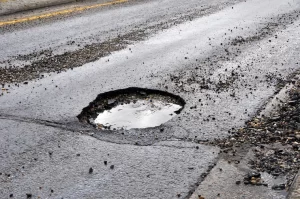The City of Chicago Doesn’t Think It Owes Our Client a Legal Duty to Keep the Roadways Safe for
On a damp early fall evening in 2014, our client was quietly riding a bicycle on a street in the City of Chicago, returning form a dinner with friends. Night had fallen and the ground was damp, but our client was prepared for a safe ride with a bike light. Cycling was a passion of our clients, after all. (S)he rode in cycling clubs, and tried to commute via bicycle as often as practical. (S)he knew how to ride in the city better than most, and a little bit of rain was nothing to worry about.
The rain started getting heavier throughout the ride, and our client was focused on getting home safely.
As (s)he approached an intersection, (s)he suddenly felt a tremendous force thrusting him/her, face fist, into the ground. (S)he helplessly crashed into the hard, wet cement of the Chicago street at full speed before (s)he even knew what hit her/him. For a brief moment, there was silence and stillness as (s)he laid on the ground confused and in a great deal of pain.
After slowly lifting his/her head up off the street, struggling to regain her/his bearings, our client noticed the crash’s culprit: the front tire of the bicycle had become lodged in a large, deep pothole, stopping the bike dead in its tracks and sending our client flying off the bike at full speed. There were no markings on the pavement or signs on the street indicating the presence of a dangerous road defect, much less any indication that anyone had ever tried to repair it.
Given this lack of attention, one might think that the City of Chicago, which owns and has a legal duty to maintain all streets within city limits, had no idea the pothole was even there at all. But one would be wrong. In fact, the City of Chicago had actually been informed about that specific pothole almost two months before our client’s encounter with it via multiple complaints through the city’s 311 system.
The City knew the pothole was there, and not only failed to fix it after almost two months, but failed to even take the basic step of placing a cone or some sort of sign near the pothole to warn cyclists and motorists alike. Such a simple act could have prevented our client from being hauled off to the hospital with serious injuries and a large hospital bill.
Seeing the obvious negligence on the part of the city and the serious injuries sustained by our client, Chicago Bike Law Firm agreed to represent the Plaintiff in a personal injury lawsuit against the city for their failure to maintain the roadway in question. Our client wanted the city to be held accountable for its failure to keep the roads safe for cyclists in Chicago, and so did we. After all, Mayor Rahm Emanuel and other civic leaders had amassed quite a bit of publicity in recent years painting Chicago as a “bike-friendly city,” but if the streets were too dangerous for cyclists to ride, how could the city possibly call itself “bike-friendly?”
In the course of our lawsuit, attorneys for the City filed a motion for summary judgment, claiming that a particular Illinois Supreme Court case, Boub v. Township of Wayne, stood for the proposition that a city couldn’t be held liable for damages sustained by a cyclist like our client unless (s)he was riding in a marked bike lane. And because there was no marked bike lane on the street where the crash occurred, the city argued that it didn’t owe our client (along with all other cyclists who might use the road) a legal duty to maintain the road. Unfortunately, the trial court agreed, dismissing our client’s case.
We have filed an appeal. The Boub case held that municipalities like the City of Chicago don’t owe a duty to cyclists to properly maintain their roads unless the cyclists are both intended AND permitted users of the roadways. The City of Chicago has for years assumed that this distinction effectively means it doesn’t have to take responsibility for cyclist injuries caused by defective roads unless those cyclists are riding in marked bike lanes at the time of their crashes. And as anyone who has ever cycled in this city knows, marked bike lanes, in most parts of the city, are few and far between.
You can read the details of our argument against the city’s strange position here in our appellate brief, but needless to say, the city’s claim that it can’t be held responsible for causing our client’s injuries is in direct conflict with its very public desire to not only encourage people to bike throughout the city, but to convince young adults, tech start ups, and even large technology companies like Amazon that this is a bike-friendly, modern city. It is also, in our opinion, in direct conflict with the actual decision in the Boub case, as well as simple fairness and common sense. Feel free to see the details of our arguments by clicking the link above.
Failing to fix or even warn residents about a large pothole for almost two months and then denying that it owes anything to a cyclist who was severely injured by said pothole? Doesn’t sound very bike-friendly to me.
We’ll keep you updated on how this case progresses.

